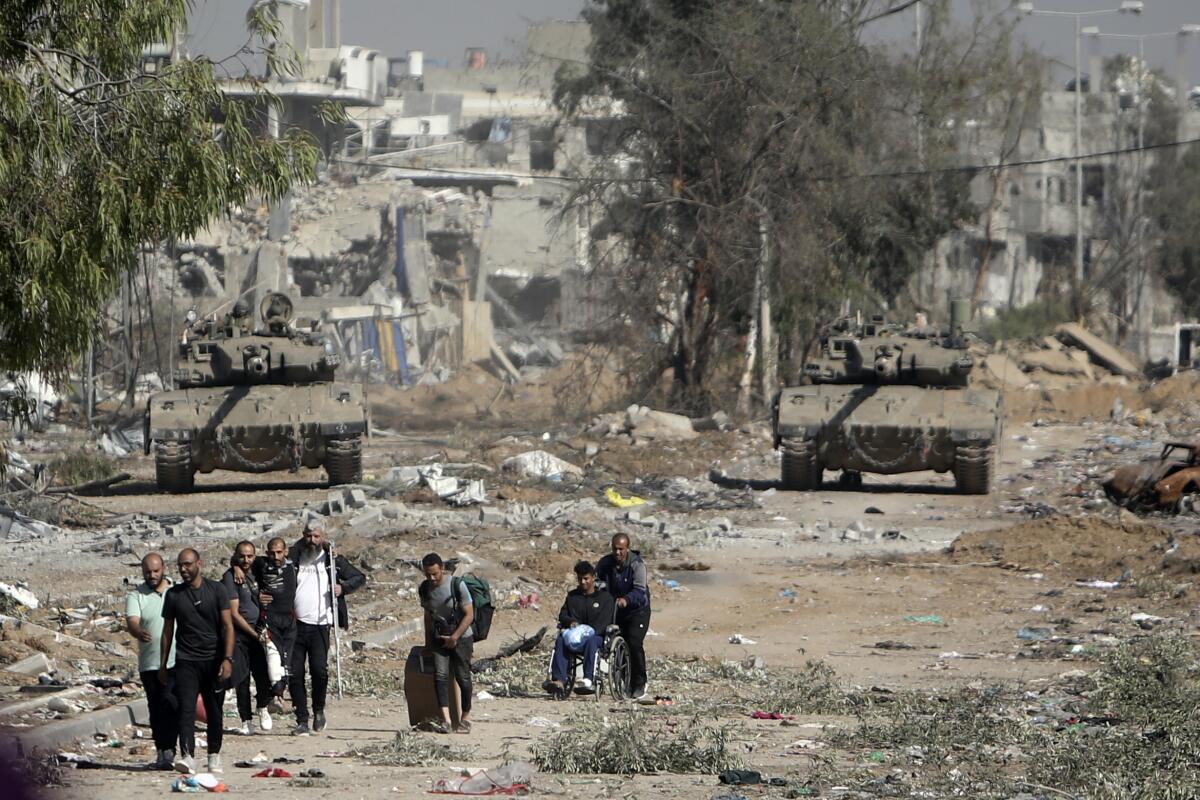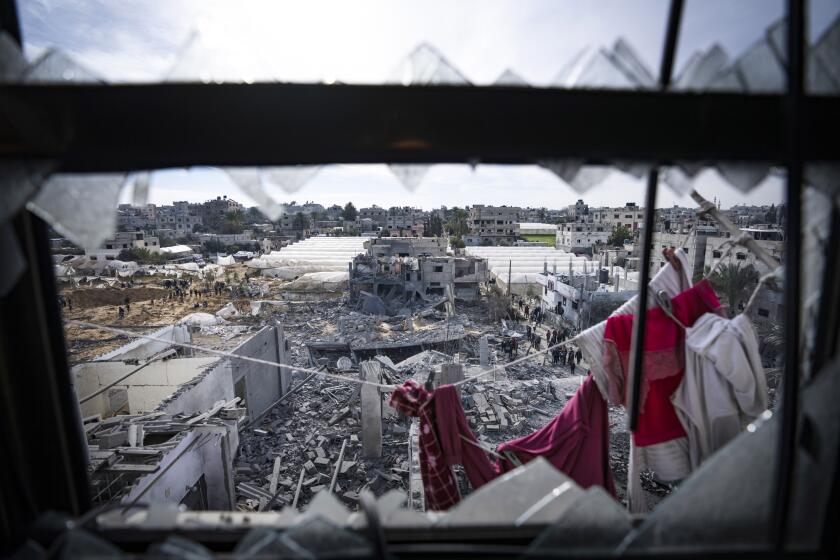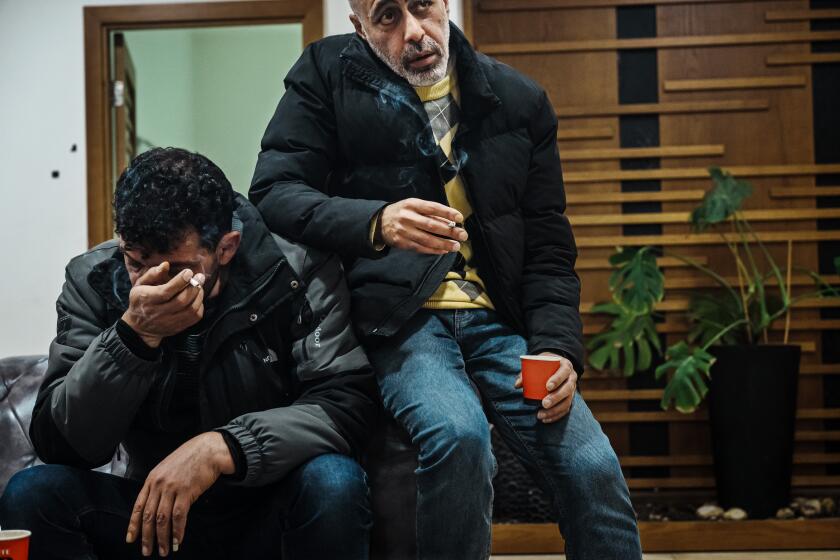After six months of war, Israel’s isolation and Gaza devastation grow

- Share via
JERUSALEM — When Israel declared war against Hamas last October, it stood unified at home and had backing from around the world following an unprecedented attack by the Islamic militant group.
Six months later, Israel is bogged down in Gaza, divided domestically, isolated internationally and increasingly at odds with its closest ally. The risk of a broader regional war remains real.
Despite Israel’s military onslaught that has left much of Gaza in ruins, Hamas is still standing, if significantly weakened. The offensive has pushed Gaza into a humanitarian crisis, displacing more than 80% of the population and leaving more than 1 million people on the brink of starvation. Yet Israel hasn’t presented a postwar vision acceptable to its partners, and cease-fire talks remain at a standstill.
Here are six takeaways that look at the first six months of warfare and what they could mean for Israel’s next moves.
Stalemate in Gaza
Israel declared war in response to Hamas’ Oct. 7 cross-border attack, in which the militant group killed about 1,200 people, most of them civilians, and kidnapped about 250 others.
Prime Minister Benjamin Netanyahu set two objectives: destroying Hamas and bringing home the hostages. Despite his repeated pledges to achieve “total victory,” his goals remain elusive.
After bombardment and ground attacks across most of Gaza, Israeli ground troops are in a holding pattern marked by small operations and uncertainty over whether the army will march into the southern Gaza city of Rafah, Hamas’ last significant stronghold.
Gazans crammed into Rafah along the Egyptian border have no place to escape as Israeli attacks hit ever closer in a final bid to rescue remaining hostages.
Netanyahu has repeatedly vowed to invade Rafah, but he faces broad international opposition, including from the United States, because of the hundreds of thousands of displaced Palestinians sheltering there. Netanyahu claims to have a plan to evacuate the civilians, but it isn’t clear whether it is ready or would satisfy the Americans.
Even if Israel does invade Rafah, there is no guarantee of long-term success. Although Hamas appears to have suffered heavy losses, its forces have managed to regroup in areas abandoned by Israel.
At the same time, Israel hasn’t been able to halt the daily attacks it faces on its northern front from the Lebanese militant group Hezbollah. In contrast to Hamas, Hezbollah’s much larger arsenal remains intact, leaving the fate of tens of thousands of uprooted civilians on both sides of the border up in the air. The tensions have threatened to drag in Hezbollah’s sponsor, Iran, especially after an airstrike widely attributed to Israel killed two Iranian generals in neighboring Syria this week.
With family trapped in Gaza, two Palestinian friends in the West Bank hold each other up amid crushing grief.
Growing isolation amid cease-fire calls
Israel had broad international support following the Oct. 7 attack, which was the deadliest assault against Jews since the Holocaust. That goodwill has been replaced by impatience and outrage as the Gaza death toll rises and humanitarian conditions worsen.
Israel’s bombardment and ground attacks have killed 33,000 Palestinians, around two-thirds of them women and children, according to Palestinian health officials whose death toll doesn’t distinguish between civilians and fighters. International aid officials say roughly one-third of Gaza’s population is dealing with catastrophic hunger.
Initial expressions of solidarity from Israel’s allies have given way to calls for a halt to the fighting. Meanwhile, the United Nations world court, looking into genocide allegations against Israel, has ordered Israel to do more to protect Gaza’s civilians.
This isolation appeared to peak on March 25, when the U.N. Security Council, over Israeli objections, passed a resolution demanding an immediate cease-fire. The U.S. infuriated Israel by allowing the resolution to pass.
And outrage against Israel’s actions in Gaza has increased, especially following its killing of seven aid workers in what the military says was a mistake. Six of the victims were volunteers from countries allied with Israel, antagonizing them and angering President Biden. The airstrike on Iran’s embassy in Syria, widely attributed to Israel, as well as Netanyahu’s efforts to shutter the Arab satellite channel Al Jazeera have further alienated allies.
Israel is divided
After a period of broad unity early in the war, Israel has returned to its divided self — with its polarizing leader at the center of the storm.
Weekly protests against the government have grown and attract thousands. They are rooted in longstanding grievances against Netanyahu — from his political alliances with far-right and ultra-Orthodox parties to his open-ended corruption trial. However, they have drawn new strength from his failure to bring home the hostages.
Roughly half of the hostages were released during a weeklong cease-fire in November. But Israel says 134 remain in captivity. Israel has declared more than 30 hostages dead — and there are widespread fears that the true number is higher and will continue to rise the longer they are held.
The plight of the hostages and the pleas from their families have resonated deeply with the Israeli public. Some hostage families were among the tens of thousands of people who took to the streets recently calling on the government to resign. It was the largest antigovernment demonstration since the war began.
Netanyahu isn’t going anywhere
Netanyahu’s popularity has plummeted since the outbreak of the war, with many holding him responsible for the intelligence and security failures that allowed the Oct. 7 attack to occur. Yet he has rebuffed calls to resign or launch investigations into what went wrong.
Netanyahu faces no immediate threat to his rule. For now, his coalition partners, also facing likely losses at the polls, remain firmly behind him.
Ironically, the biggest immediate threat to Netanyahu is only peripherally related to the war. Israel’s Supreme Court has ordered a halt to a long-standing controversial system of exempting ultra-Orthodox men from compulsory military service.
With more than 600 soldiers killed since Oct. 7, Netanyahu will have a tough time continuing this system. But if he tries to force religious men into military service, he could lose the support of his ultra-Orthodox partners and be forced into early elections.
“Netanyahu is incapable of either feeling shame or taking responsibility,” wrote Anshel Pfeffer, a Haaretz columnist and author of a Netanyahu biography. “He has no intention of ever resigning on his own accord.”
Religious Zionists, most believing in a divine right to govern, now have outsize influence in Israel. The war in the Gaza Strip is energizing their settlement push.
Hamas isn’t going anywhere
Israel’s attacks have caused mass destruction across Gaza and inflicted heavy losses on Hamas. Israel claims to have killed some 13,000 Hamas fighters and dismantled the group’s military capabilities across most of Gaza, but has not given evidence.
Yet even if these claims are true, Hamas is still intact in Rafah, and its fighters have regrouped in areas where Israel previously declared victory. Although there have been small shows of public discontent with Hamas in Gaza, there have been no public signs of broad opposition to the group.
Khalil Sayegh, a Palestinian analyst, said Hamas keeps reappearing and Israel hasn’t allowed any alternative to emerge.
“When you’re fighting a guerrilla war, I think the ultimate success or failure is whether you’re able to survive,” he said. “So if Hamas survives as a governing body, then this will be a success.”
Michael Milshtein, a former high-ranking Israeli military intelligence officer who is now an expert in Palestinian studies at Tel Aviv University, says Israel faces two unappealing choices: Accept a hostage and cease-fire deal that acknowledges Hamas has survived, or step up the military campaign and conquer Gaza in hopes that Hamas will eventually be destroyed.
He said expectations that the Israeli military’s current approach can destroy Hamas or force it to surrender is “wishful thinking.”
No postwar policy
There is no consensus for the future of Gaza.
Netanyahu has presented a vague vision that calls for open-ended Israeli control of the territory, with local Palestinian partners in Gaza administering day-to-day affairs. Israel hopes for reconstruction to be funded by the international community, including wealthy Arab Gulf states.
These plans, though, clash with visions promoted by Palestinians as well as the U.S. and other international partners.
The U.S. has called for a return of the internationally recognized Palestinian Authority, which Hamas ousted from Gaza in 2007, and for renewed efforts to establish an independent Palestinian state in the West Bank and Gaza. The Authority, based in the Israeli-occupied West Bank, recently appointed a new prime minister to address American calls for reform.
Netanyahu opposes Palestinian statehood or any role for the Authority. Meanwhile, there is little appetite among donor nations to contribute to reconstruction without a political consensus. The United Arab Emirates, for instance, says it will not fund reconstruction without a viable two-state approach.
Federman writes for the Associated Press. AP reporters Melanie Lidman and Julia Frankel contributed.
More to Read
Sign up for Essential California
The most important California stories and recommendations in your inbox every morning.
You may occasionally receive promotional content from the Los Angeles Times.













